Friedrich Engels
|
|
Friedrich Engels (November 28, 1820–August 5, 1895) was a 19th-century German political philosopher. With his partner, the better known Karl Marx, Engels developed communist theory, co-authoring The Communist Manifesto (1848). Engels also edited several volumes of Das Kapital after Marx's death.
| Contents |
Biography
Engel's_House_in_Primrose.JPG
Engels was born in Barmen-Elberfeld (now Wuppertal), the eldest son of a successful German textile industrialist. As a young man, his father sent him to England to help manage his cotton factory in Manchester. Shocked by the widespread poverty, he began writing an account which was published in 1845 as Condition of the Working Class in England in 1844 (http://www.marxists.org/archive/marx/works/1845/condition-working-class/index.htm).
In the same year, Engels began contributing to a journal called the Franco-German Annals, which was edited and published by Karl Marx in Paris. After their first meeting in person, they discovered that they both shared the same views on capitalism, and decided to work more closely together. After Marx was deported from France in January 1845, they decided to move to Belgium, which permitted greater freedom of expression than other countries in Europe.
In July 1845, Engels took Marx to England. There he met an Irish working-class woman named Mary Burns, with whom he lived until her death; then he lived with her sister, Lizzie. These women may have introduced him to the Chartist movement, of whose leaders he met several, including George Harney. Engels and Marx returned to Brussels in January 1846, where they set up the Communist Correspondence Committee. The plan was to unite socialist leaders living in different parts of Europe. Influenced by Marx's ideas, socialists in England held a conference in London where they formed a new organization called the Communist League. Engels attended as a delegate and had a great impact on the developed strategy of action.
In 1847, Engels and Marx began writing a pamphlet together. It was based on Engels' The Principles of Communism. The 12,000-word pamphlet was finished in six weeks, written in such a manner as to make communism understandable to a wide audience. It was named The Communist Manifesto and was published in February 1848. In March, both Engels and Marx were expelled from Belgium. They moved to Cologne, where they began to publish a radical newspaper, the New Rhenish Gazette.
Engels was an active participant in the Revolution of 1848, taking part in the uprising at Elberfeld. Engels fought in the Baden campaign against the Prussians (June/July 1849) as the aide-de-camp of August Willich, who was leader of a Free Corps in the Baden-Palatinate uprising. [1] (http://www.marxists.org/archive/marx/works/1850/german-imperial/ch01.htm)
By 1849, both Engels and Marx were forced to leave the country and moved to London. The Prussian authorities applied pressure on the British government to expel the two men, but Prime Minister John Russell held refused. With only the money that Engels could raise, the Marx family lived in extreme poverty.
In order to help supply Marx with an income, Engels returned to work for his father in Manchester, before moving to London in 1870. After Marx's death in 1883, Engels devoted the rest of his life to editing and translating Marx's writings. He died in London in 1895.
Works
- Anti-Dühring [2] (http://www.marxists.org/archive/marx/works/1877/anti-duhring/index.htm)
- Dialectics of Nature [3] (http://www.marxists.org/archive/marx/works/1883/don/index.htm)
- Ludwig Feuerbach and the End of Classical German Philosophy [4] (http://www.marxists.org/archive/marx/works/1886/ludwig-feuerbach/index.htm)
- Origins of the Family, Private Property, and the State [5] (http://www.marxists.org/archive/marx/works/1884/origin-family/index.htm)
- Revolution and Counter-Revolution in Germany [6] (http://www.marxists.org/archive/marx/works/1852/germany/index.htm)
- The German Ideology (with Marx) [7] (http://www.marxists.org/archive/marx/works/1845/german-ideology/index.htm)
- The Holy Family (with Marx) [8] (http://www.marxists.org/archive/marx/works/1845/holy-family/index.htm)
- The Peasant War in Germany [9] (http://www.marxists.org/archive/marx/works/1850/peasant-war-germany/index.htm)
See also
External links
Template:Wikiquote Template:Wikisource author
- The Marx & Engels Internet Archive (http://www.marxists.org/archive/marx/index.htm) at Marxists.org.
- Marx/Engels Biographical Archive (http://www.marxists.org/archive/marx/bio/index.htm)
- Friedrich Engels - A Biography (http://www.indepthinfo.com/communist-manifesto/engels.shtml)
- Marx & Engels in their native German language (http://www.mlwerke.de/me/)bg:Фридрих Енгелс
ca:Friedrich Engels da:Friedrich Engels de:Friedrich Engels et:Friedrich Engels es:Friedrich Engels eo:Friedrich ENGELS fr:Friedrich Engels fy:Friedrich Engels ko:프리드리히 엥겔스 hr:Friedrich Engels id:Friedrich Engels he:פרידריך אנגלס it:Friedrich Engels lt:Frydrichas Engelsas nl:Friedrich Engels ja:フリードリヒ・エンゲルス no:Friedrich Engels pl:Fryderyk Engels pt:Friedrich Engels ro:Friedrich Engels ru:Энгельс, Фридрих sk:Friedrich Engels sl:Friedrich Engels fi:Friedrich Engels sv:Friedrich Engels tr:Friedrich Engels zh:弗里得里希·恩格斯

